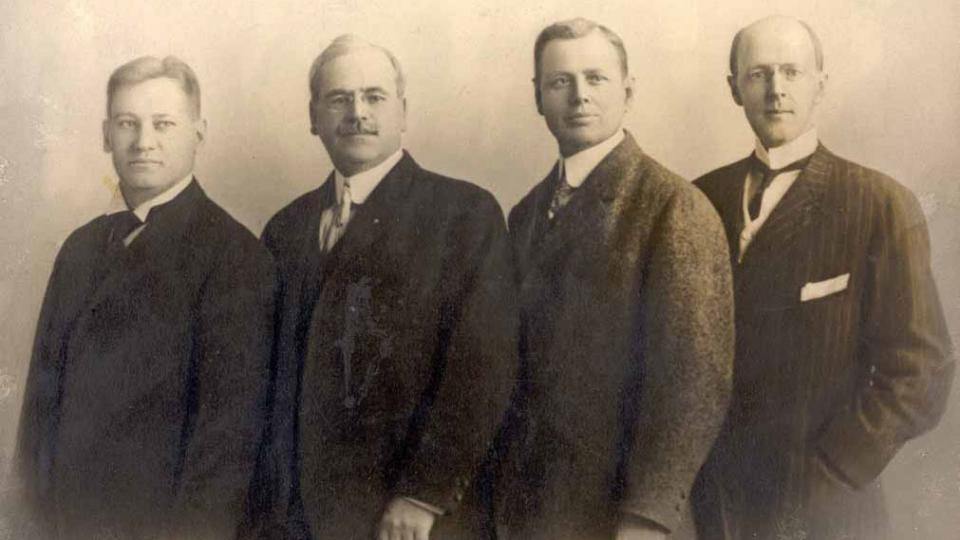

Rotarians connect leaders, link diverse perspectives and build lasting relationships to take action in our communities at home and around the globe. Discover who we are, what we do, and how we take on some of the world's most challenging problems.
Structure of Rotary
Rotary International
Rotary International is the global association of Rotary Clubs. Our 1.2 million members are the heart of our service efforts and share a dedication to the ideal of Service Above Self. There are 1.2 million Rotarians in 34,000 clubs doing good all over the world. This network of clubs makes up Rotary International.
As a club member you help elect your own leaders each year, and your president works with your president-elect, officers, board members, and committee chairs to manage the club. Your club pays dues to RI, and in return RI provides resources, training, and programs to help your club run effectively.
Your club and others in your geographic area are part of a district, led by your district governor. Districts help clubs connect to each other and access Rotary resources. There are around 530 districts, and these are organized into 34 zones. Each zone has about the same number of Rotarians.
The Rotary Foundation
The Rotary Foundation is a nonprofit corporation that promotes world understanding through humanitarian service as well as educational and cultural exchanges. The Foundation ensures we can continue our efforts for generations to come. The mission of The Rotary Foundation is to enable Rotarians to advance world understanding, goodwill, and peace through the improvement of health, the support of education, and the alleviation of poverty.
The Rotary Foundation helps fund our humanitarian activities, from local service projects to global initiatives. Your club or district can apply for grants from the Foundation to invest in projects and provide scholarships. The Foundation also leads the charge on worldwide Rotary campaigns such as eradicating polio and promoting peace. Rotarians and friends of Rotary support the Foundation's work through voluntary contributions.
Guiding principles
For more than 100 years, our guiding principles have been the foundation upon which our values and tradition stand. The Four-Way Test, Object of Rotary, and the Avenues of Service express our commitment to service, fellowship, diversity, integrity, and leadership.
Our partners
Rotary collaborates with international, governmental, and university groups to tackle global humanitarian issues.
Working with partners
Rotary's relationship with the following partners opens the door for Rotarians to work with them directly:
Our strategic partners
We work with our strategic partners to design packaged grants for large-scale, sustainable projects that support our areas of focus.
United Nations and Nongovernmental Organizations
Rotary appoints representatives each year to UN bodies and NGOs worldwide. Rotary's representatives meet regularly with officers and staff from international agencies to:
History of Rotary International

The first four Rotarians (from left): Gustavus Loehr, Silvester Schiele, Hiram Shorey, and Paul P. Harris, circa 1905-12.
Photo Credit: Courtesy of Rotary International.
Paul P. Harris, an attorney, wanted to create a professional group with the same friendly spirit he felt in the small towns of his youth. On 23 February 1905, Harris, Gustavus Loehr, Silvester Schiele, and Hiram Shorey gathered at Loehr's office in Room 711 of the Unity Building in downtown Chicago. This was the first Rotary club meeting. They decided to call the new club "Rotary" after the practice of rotating meeting locations. Within five years clubs had formed across the country, from San Francisco to New York. In August 1910, Rotarians held their first convention in Chicago. The 16 clubs that existed at that time united to form the National Association of Rotary Clubs.
In 1912, the name changed to International Association of Rotary Clubs to reflect the addition of clubs in other countries. The name Rotary International was adopted in 1922.
By July 1925, Rotary had grown to more than 2,000 clubs and an estimated 108,000 members on six continents. Rotary's reputation attracted presidents, prime ministers, and a host of other luminaries to its ranks - among them author Thomas Mann, diplomat Carlos P. Romulo, and composer Jean Sibelius. As Rotary grew, members pooled their resources and used their talents to serve their communities. The organization's dedication to this ideal is best expressed in its motto: Service Above Self.
For more information visit Rotary International web site www.rotary.org